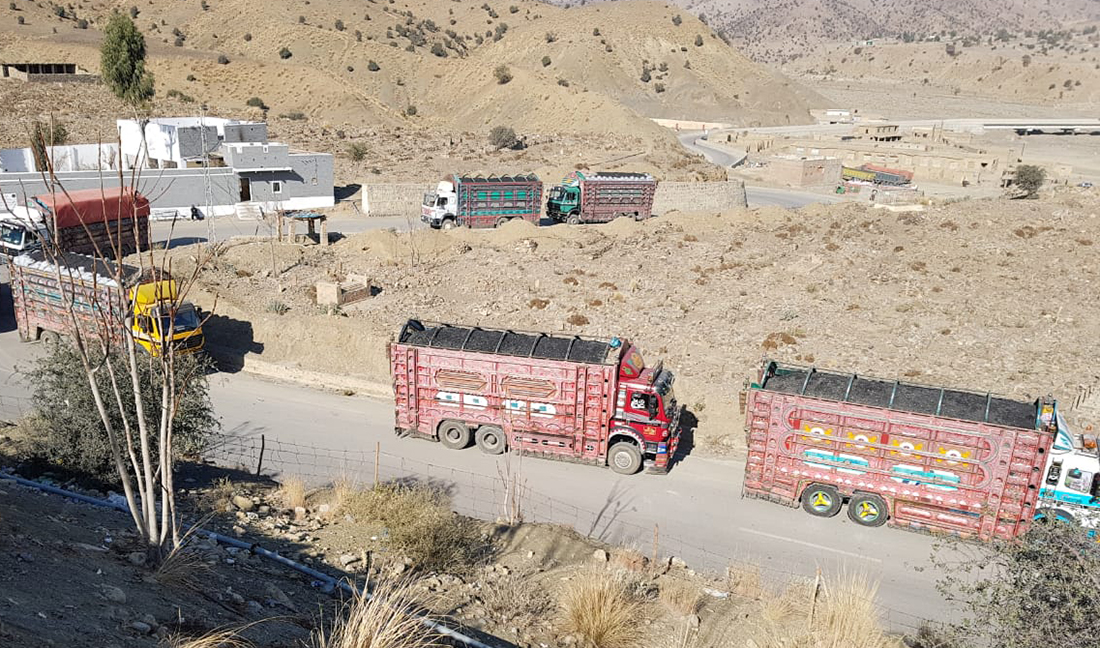PESHAWAR: Nearly four months after closing them down to contain the spread of COVID-19 in the country, Pakistan has reopened the Torkham and Chaman border crossings to allow for trade with Afghanistan, with operations at the third route to resume on Monday, the Foreign Ministry (FM) said in a statement released yesterday.
It quoted Aisha Farooqui, the FM spokesperson, in saying that the decision to reopen the trade routes was based on Kabul’s request, brotherly ties between the two countries, and to facilitate the people of Afghanistan.

Pakistani and Afghan officials are walking toward the meeting venue at the Ghulam Khan border crossing on June 18, 2020. (Photo courtesy: North Waziristan administration)
“Keeping in view both countries’ desire to further increase mutual trade, in view of strong fraternal ties and due to renewed Afghan government’s request, it has been decided that with effect from 22 June 2020, the third border terminal at Ghulam Khan will be opened for bilateral trade and to allow transit trade and import from Afghanistan through Torkham and Chaman border terminals as well,” excerpts from the statement read.
It added that starting Monday, trading will resume for six days a week, while Saturdays will be reserved for pedestrian movement.
“These steps are being taken after implementing all necessary protocols related to COVID-19 pandemic,” the statement said.
It follows a meeting last week between the officials of the two countries along the borderline which separates Pakistan’s dusty Ghulam Khan town in North Waziristan from the adjoining Afghan territory in the Khost province.

Pakistani and Afghan officials hold a meeting at the Ghulam Khan border crossing on June 18, 2020. (Photo courtesy: North Waziristan administration)
“The (Ghulam Khan) border will be made functional from June 22 to facilitate round-the-clock bilateral trade between the two countries,” Ghani-ur-Rehman, a senior district administration official in North Waziristan, told Arab News on Thursday. “We will also take necessary precautions to prevent the spread of the COVID-19 disease.”
Farooqui said in a statement that the opening of Ghulam Khan border crossing terminal and allowing imports from Afghanistan reflects Pakistan’s resolve to help Afghanistan and facilitate its trade.
“Pakistan is a major trading partner of Afghanistan and the largest market for Afghan exports. The opening of the Gwadar Port for Afghanistan’s export and import has further strengthened trade linkages between the two countries,” she said, adding that Pakistan will continue to support a peaceful and economically-stable Afghanistan.”
Earlier, on June 18, Afghan envoy in Pakistan, Atif Mashal, told Arab News he had held a series of meetings with senior Pakistani officials in Islamabad to strengthen bilateral trade and commerce between the two states.
“We are striving to keep the flow of trade unhindered at Chaman, Torkham and Ghulam Khan crossing points,” he said. “This will serve the economic interests of both countries. I believe that any political tensions between the two neighbors must not be allowed to overshadow their trade ties.”
Pakistan temporarily closed its border with Afghanistan in March this year, due to the spread of the novel coronavirus in the region.
However, in a meeting last month, the National Command and Operation Center decided to relax restrictions at the Torkham and Chaman border crossings to resume commercial activities.
According to Faiz Muhammad, an executive member of the Sarhad Chamber of Commerce and Industry, the quantum of trade between Pakistan and Afghanistan was $1.2 billion before the emergence of the virus. However, officials in both countries were hoping to increase the trade value to $3.5 billion.
“The outbreak of the pandemic has considerably slowed down commercial activities across the world, and this trade volume has also gone down to about $1 billion,” he continued.

In this January 31, 2020 file photo, heavy vehicles move toward Afghanistan via the Ghulam Khan border crossing in North Waziristan tribal district. (Photo courtesy: North Waziristan district administration)
Almost 50 percent of the Pak-Afghan trade, he added, took place through Chaman, 40 percent via Torkham and Ghulam Khan’s potential was still to be evaluated with greater certainty and precision after it became fully operational.
Abdullah Dawar, a customs clearing agent and businessman, based in Ghulam Khan, told Arab News that officials and traders in Miran Shah, the headquarters of the North Waziristan tribal district, had welcomed the latest initiative since it would provide a livelihood to thousands of families
“Pakistan mainly exports cement, fruits, vegetables, cold drinks, construction materials and other items to Afghanistan while importing dried fruit and fresh vegetables from the neighboring state,” he added.
Hajji Usman, a member of the Afghan Trade and Commerce Association, told Arab News that the reopening of Ghulam Khan would substantially increase the bilateral trade between the two countries since “the border in North Waziristan is closer than Torkham to Karachi.”
“Afghanistan and Pakistan are carrying out their trade activities through Torkham and Chaman,” he said, “but they should also begin to take Ghulam Khan more seriously. Businesses have already suffered huge losses due to the coronavirus pandemic. The reopening of Ghulam Khan will provide fresh impetus to trade and commerce in the region.”












